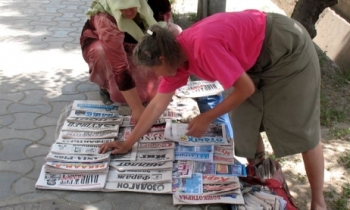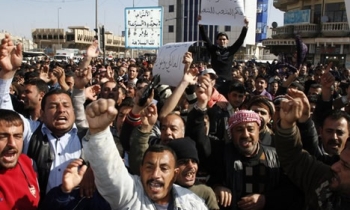Iran has launched an English-language satellite television channel to redress the balance of world news coverage which was now in the grip of the West.
President Mahmoud Ahmadinejad said at the launch function Monday that the 24-hour channel had a duty "to reveal (what goes on) behind the scenes of the propaganda news networks of mankind's enemies." He said the state-owned channel should stand "beside the oppressed nations of the world but not make news up in their favuor."
Ahmadinejad said, "The message of media is the same as that of prophets." He went on, "All efforts should be directed so that borders between 'truth and false', 'selfishness and divinity', and 'loving mankind and oppressing, threatening them' could be clearly in front of world people's eyes." Ahmadinejad called such news dissemination as a "diligence and struggle" and added, "The TV which is born today should be beside to the world oppressed people."
PRESS TV officials have said the channel would seek to take on established players like CNN and BBC World, Reuters reported.
The Iranian channel faces an increasingly crowded field of English-language satellite channels after last year's launch of Al Jazeera International by the Qatar-based broadcaster and France 24, which promised a "French vision".
The channel says on its Web site (www.presstv.ir) it aims "to break the global media stranglehold of Western outlets."
The first broadcast, a news bulletin, went out at 1630 GMT, a PRESS TV journalist told Reuters, speaking from the newsroom.
"What we wanted to do by setting up PRESS TV was to give a medium through which the balance of reportage could be redressed," said Shahab Mossavat, a spokesman for the channel who will also host the show "Middle East Today" once a week.
Mossavat said the channel wanted to reach English speakers all over the world and draw in those who were dissatisfied with news coverage now available. "There is a lot of sloppy journalism out there. I just hope we are not going to be accused of being sloppy," he said, adding that some other channels did not "always cover every angle".
Mohammad Sarafraz, deputy head of Iran's broadcasting company in charge of foreign channels, told teh Associated Press (AP) that more than three million people, one-half of them from the United States, had visited Press TV's website over the last six months. Sarafraz said the 24-hour channel would broadcast news every half-hour. He said the channel also plans to broadcast documentaries on US soldiers who quit the military.
The Tehran-based channel has Iranians and foreigners on its staff with offices in Washington, London, Paris, Moscow, Beirut, Damascus, and elsewhere, the Reuters report said. Iran's state broadcaster already runs the Arabic-language satellite channel Al-Alam and the Persian-language Jaam-e Jam.
Officially, ordinary Iranians cannot see any of these channels at home because satellite dishes are banned. In practice, the ban is only sporadically enforced and such dishes are plainly visible on rooftops in Tehran and elsewhere.
Mossavat told Reuters that PRESS TV would include criticism of Iranian policies and politics but would give Iranian officials "the right to redress and try to balance the story." Foreign journalists working in Iran say a challenge they often face is reaching Iranian officials swiftly for comment.









